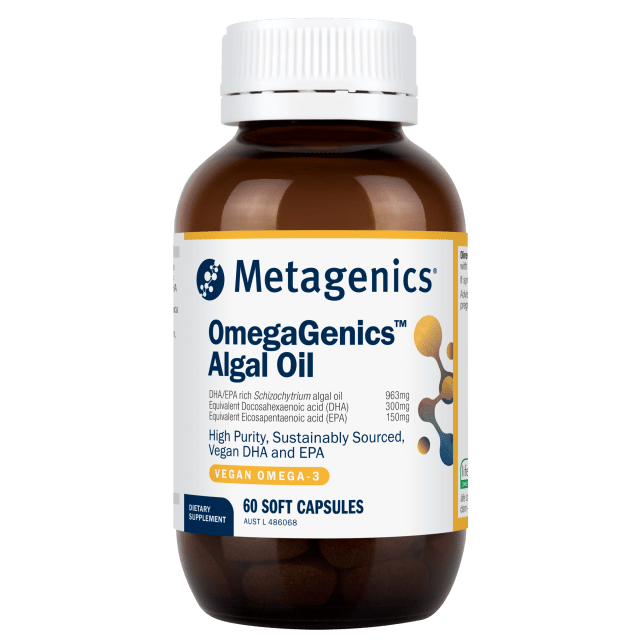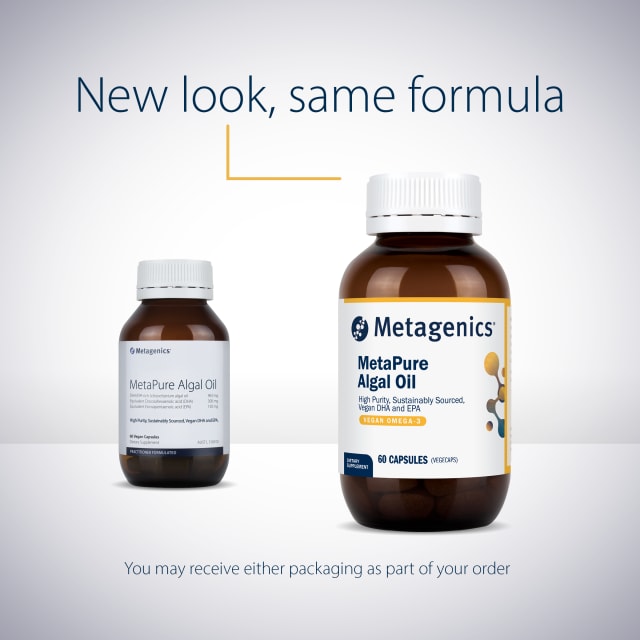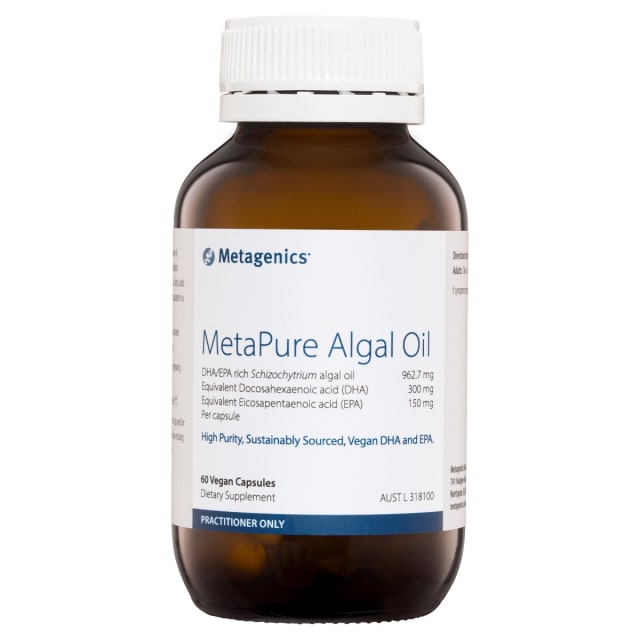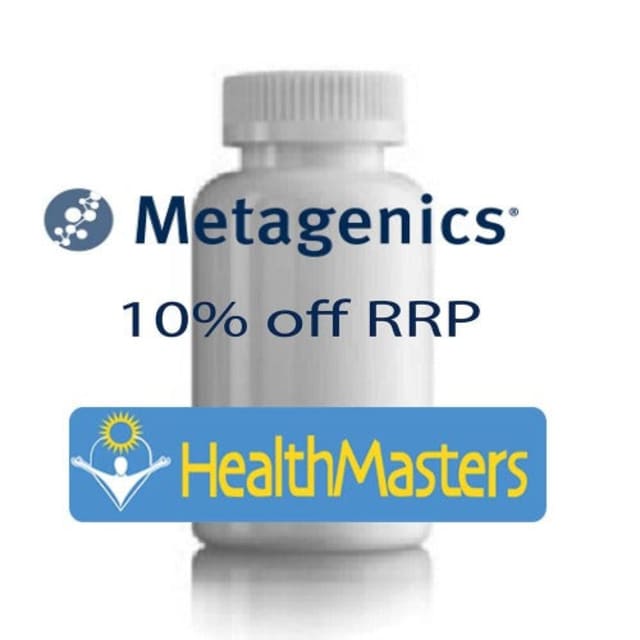To help us enhance our site, we use cookies for analytics; your data is never sold.





Metagenics OmegaGenics Algal Oil 60 capsules (MetaPure Algal Oil)
Please log into your patient account below, otherwise you can create an account.
Formerly Metagenics MetaPure Algal Oil
High Purity, Sustainably Sourced, Vegan DHA and EPA.
New name, same formula
High Purity, Sustainably Sourced, Vegan DHA and EPA.
Metagenics OmegaGenics Algal Oil (MetaPure Algal Oil)
Metagenics OmegaGenics Algal Oil Size: 60 tapioca-based softgel capsules (30 days)
Ingredients in Metagenics OmegaGenics Algal Oil have been shown to:
- Provide a sustainable and pure source of vegan omega-3 fatty acids for health and wellbeing.
- Support cognitive and mental function.
- Maintain a healthy pregnancy.
Metagenics MetaPure Algal Oil is Dairy protein free, Lactose free, Egg free, Gluten free, Wheat free, Free from Nuts, Free from Yeast and Free from Soy protein
Metagenics MetaPure Algal Oil AUST L 486068
Directions
Adults: Take 1 capsule twice daily with food
Benefits
- Metagenics OmegaGenics Algal Oil provides a vegan source of omega-3 essential fatty acids (EFAs) derived from algae, encapsulated in tapioca-based softgels. Algae-rich EFAs exert the same therapeutic benefits as EPA and DHA derived from traditional fish oil. Metagenics OmegaGenics Algal Oil is sourced from algae grown under closed and controlled conditions, ensuring the algae are not exposed to environmental contaminants present in oceans. Metagenics OmegaGenics Algal Oil is rigorously screened for contaminants such as heavy metals (cadmium, lead, mercury and arsenic) and oxidation (anisidine and peroxide), ensuring purity levels that significantly exceed TGA standards, delivering a fresh and pure product.
- Metagenics MetaPure Algal Oil contains vegan-friendly DHA, which is required for brain, nervous system and cognitive health.1 DHA is integral to neural membrane phospholipid composition in the brain, retina and neural tissues,2 making DHA an essential prescription for people affected by memory or vision-related conditions. Both EPA and DHA have been shown to improve cognitive function3 while EFAs have been shown to regulate mood.4
- DHA is essential for prenatal human brain development5 with a deficiency having marked consequences for vision, cognition, cerebellar function, and neurological health.6 DHA is critical for brain growth, which is especially rapid from the third trimester of pregnancy until 18 months after birth.7,8 DHA is conferred to infants via the placenta and breastfeeding; however, human milk levels of DHA have shown variations relating to maternal dietary DHA intake.9,10
-
Metagenics MetaPure Algal oil provides a vegan source of EPA and DHA, ideal for those undertaking sustainable or vegan lifestyles looking to maintain general health. Up to 80% of Australians are not meeting the recommended daily intake for omega-3 EFAs.11 Omega-3 EFAs play key roles in the body, influencing inflammatory mechanisms and the health of cell membranes, the brain and cardiovascular, reproductive, and musculoskeletal systems.12,13,14,15,16,17,18,19,20 Although dietary intake is important, enzymatic conversion in the body to yield EPA and DHA is inefficient, reinforcing the importance of omega-3 supplementation.Life's
Omega logolife's® OMEGA is a trademark of DSM
Ingredients
| Each Metagenics OmegaGenics Algal Oil capsule contains: | |
| DHA/EPA-rich Schizochytrium algal oil | 962.7mg |
| Equivalent Docosahexaenoic acid (DHA) | 300mg |
| Equivalent Eicosapentaenoic acid (EPA) | 150mg |
Metagenics OmegaGenics Algal Oil is free from animal products, dairy protein, lactose, eggs, gluten, wheat, nuts, yeast and soy protein.
Metagenics OmegaGenics Algal Oil is free from artificial colours, flavours and preservatives.

Warnings
Not all cautions and contraindications are listed. For full details, references or more information, contact HealthMasters in Australia by email: reception@healthmasters.com.au.
Always read the label. Use only as directed. If symptoms persist, consult your healthcare professional.
Cautions and Contraindications
Contraindications
- None of note.
Moderate Level Cautions
- Anticoagulant/antiplatelet drugs: Clinical trials have shown high-dose fish oil omega-3 fatty acid consumption to be safe, even when concurrently administered with other agents that may increase bleeding (i.e. antiplatelet or antithrombotic medications such as aspirin and warfarin). The clinical trial evidence suggests that if such an increased bleeding risk exists, the risk is very small and not of clinical significance. For example, 6.8 g of EPA/DHA daily for 6 months showed no adverse effects. However, it is reasonable to monitor patients treated with fish oils and anticoagulants for international normalised ratio (INR) as well as potential adverse bleeding experiences.83,84
- Bleeding disorders: Due to the anticoagulant properties of fish oils, there have been safety concerns in regards to the risk of increased bleeding tendency and postoperative bleeding. Although this theoretical possibility is not reflected functionally in human studies, it would still warrant caution in situations that carry a high risk of bleeding, such as haemorrhagic stroke and postoperative events. To minimise the risk of exacerbation of these bleeding events, it is recommended to discontinue use of fish oils during acute bleeding episodes, such as during and immediately after a haemorrhagic stroke, or in patients who are at high risk for haemorrhagic stroke.85,86
- Surgery: Due to the anticoagulant properties of fish oils, there have been safety concerns in regards to the risk of increased bleeding tendency and postoperative bleeding. Although this theoretical possibility is not reflected functionally in human studies, it would still warrant caution in situations that carry a high risk of bleeding, such as haemorrhagic stroke and postoperative events. To minimise the risk of exacerbation of these bleeding events, it is recommended to discontinue use of fish oils 4-7 days before elective procedures that have a high risk for bleeding complications. However, consider fish oil supplementation postoperatively if there are no bleeding complications, given that supplementation may reduce the risk of thrombotic and cardiovascular events which could occur following major surgery.87,88
References
82 Fish Oil. In: Natural Medicines Comprehensive Database [database on the Internet]. Stockton (CA): Therapeutic Research Faculty; 1995-2008 [cited 2017 Feb 21]. Available from: http://www.naturaldatabase.com. subscription required to view.
83 Bays HE. Safety considerations with omega-3 fatty acid therapy. Am J Cardiol. 2007;99(6 Suppl 1):35C-43C.
84 Harris WS. Expert opinion: Omega-3 fatty acids and bleeding – cause for concern? Am J Cardiol. 2007;99(6 Suppl 1):44C-46C.
85 Bays HE. Safety considerations with omega-3 fatty acid therapy. Am J Cardiol. 2007;99(6 Suppl 1):35C-43C.
86 Harris WS. Expert opinion: Omega-3 fatty acids and bleeding – cause for concern? Am J Cardiol. 2007;99(6 Suppl 1):44C-46C.
87 Bays HE. Safety considerations with omega-3 fatty acid therapy. Am J Cardiol. 2007;99(6 Suppl 1):35C-43C.
88 Harris WS. Expert opinion: Omega-3 fatty acids and bleeding – cause for concern? Am J Cardiol 2007;99(6 Suppl 1):44C-46C.
89 Fish Oil. In: Natural Medicines Comprehensive Database [database on the Internet]. Stockton (CA): Therapeutic Research Faculty; 1995-2008 [cited 2017 Feb 21]. Available from: http://www.naturaldatabase.com. subscription required to view.
Low Level Cautions
- None of note.
Fish Oil Consumption Does Not Increase Bleeding Risk
by Lewis Chang, PhD
Fish oil is rich in omega-3 fatty acids EPA and DHA. Increased intake of EPA and DHA is beneficial for cardiovascular health, cognitive function, mental health, maternal and child health, immunity and inflammation. EPA and DHA supplements are becoming more and more popular across a wide diversity of people, from healthy individuals to vulnerable populations with impaired health.
Higher omega-3 concentrations may compete with fatty acids such as arachidonic acid for metabolising enzymes. The interaction results in a decreased production of compounds that induce platelet aggregation and an increased production of compounds with anti-platelet properties, hence the anticoagulation benefits of omega-3. However, for patients who are under antithrombotic therapy (either with platelet aggregation inhibitors such as aspirin or anticoagulant drugs such as warfarin), the potential risk of bleeding due to the concurrent use of omega-3 fatty acids has been a concern for many clinicians, particularly surgeons.1,2
Multiple clinical studies have been conducted to investigate whether omega-3 fatty acids pose a clinically significant bleeding risk. So far, the findings have been consistent:
- A 2004 Cochrane review of 48 randomised controlled trials and 41 epidemiological analyses concludes that 0.4-7 g/day omega-3 fatty acids do not result in any change in clinical bleeding manifestations3
- A 2007 review of 19 clinical studies involving nearly 4400 surgical patients concludes that the risk for clinically significant bleeding was virtually nonexistent with the use of 1.4-21 g/day of omega-3 fatty acid supplements, even with the concurrent use of antiplatelet or antithrombotic medications4
- A 2013 systematic review of 10 randomised trials involving nearly 1000 adults 60 years or older concludes that there is no difference in total adverse event rates between daily use of placebo or 0.03-1.86 g EPA and/or DHA for 6-52 weeks5
- A 2014 review of 7 randomized controlled trials and 3 epidemiological studies concludes that omega-3 fatty acid treatment has no effect on the risk of clinically significant bleeding in either monotherapy or combination therapy settings and there is no support for discontinuing the use of omega-3 fatty acid treatment before invasive procedures6
- A 2017 systematic review based on 32 publications on healthy subjects and 20 publications on patients undergoing surgery finds that fish oil supplements reduce platelet aggregation in healthy subjects and do not increase intra- or post-operative bleedings in patients, and concludes that discontinuation of fish oils supplements before surgery is not recommended7
Despite the accumulating evidence demonstrating the safety of fish oil, the worry seems to persist, especially when at-risk patients are involved.
Most recently, researchers from Danone Food Safety Centre (Palaiseau, France) and Nutricia Research (Utrecht, the Netherlands) evaluated the safety data from 8 clinical intervention studies involving over 600 patients, including oncology patients, HIV patients, ICU patients, and patients with Alzheimer’s disease.8 The levels of omega-3 fatty acids received by these patients (either via oral consumption or tube feeding) ranged from 1.5-10.2 g/day with a duration of 8 days to 52 weeks. The outcomes included bleeding-related adverse events, prothrombin time, and partial thromboplastin time. In the end, the researchers found no evidence of increased risk of bleeding with the use of omega-3 fatty acid products in these patients, with or without concomitant use of antithrombotic medications.
In summary, the legitimate concern of increased bleeding as a result of omega-3 fatty acid intake has not been supported by numerous randomised controlled trials and epidemiological studies involving a wide range of participants, from healthy young folks to surgical patients to very vulnerable older patients.
Why is this Clinically Relevant?
- Fish oil or EPA/DHA products are associated with a variety of benefits, from cardiovascular health to cognitive function to anti-inflammation
- The concern of increased risks of bleeding associated with these ingredients has not been validated by a large number of clinical studies and systematic reviews
- Clinicians should inform patients of the safety of omega-3 fatty acids for the vast majority of the population, and there is no scientific evidence supporting the discontinuation of omega-3 products before surgery
References
1. Bays HE. Safety considerations with omega-3 fatty acid therapy. Am J Cardiol. 2007;99(6A):35C-43C.
2. Braga M, Ljungqvist O, Soeters P, et al. ESPEN Guidelines on Parenteral Nutrition: Surgery. Clin Nutr. 2009;28(4):378-386.
3. Hooper L, Thompson RL, Harrison RA, et al. Omega-3 fatty acids for the prevention and treatment of cardiovascular disease. Cochrane Database Syst Rev. 2004(4):CD003177.
4. Harris WS. Expert opinion: Omega-3 fatty acids and bleeding-cause for concern? Am J Cardiol. 2007;99(6A):44C-46C.
5. Villani AM, Crotty M, Cleland LG, et al. Fish oil administration in older adults: is there potential for adverse events? A systematic review of the literature. BMC Geriatr. 2013;13:41.
6. Wachira JK, Larson MK, Harris WS. n-3 Fatty acids affect haemostasis but do not increase the risk of bleeding: clinical observations and mechanistic insights. Br J Nutr. 2014;111(9):1652-1662.
7. Begtrup KM, Krag AE, Hvas AM. No impact of fish oil supplements on bleeding risk: a systematic review. Dan Med J. 2017;64(5).
8. Jeansen S, Witkamp RF, Garthoff JA, van Helvoort A, Calder PC. Fish oil LCPUFAs do not affect blood coagulation parameters and bleeding manifestations: Analysis of 8 clinical studies with selected patient groups on omega-3-enriched medical nutrition. Clin Nutr. 2018;37(3):948-957.
Pregnancy and Breastfeeding
Pregnancy and Breastfeeding
- Appropriate for use in pregnancy and breastfeeding feeding 82,83.
Breastfeeding
- Appropriate for use.89
Storage
Store below 25°C
Metagenics Allergy and Reactivity Program
Online ordering is available 24/7.
Your order may ship in multiple packages to ensure they reach you as soon as possible.
If any of your products are on backorder and you are within Australia, these items will ship separately as soon as they become available at no additional cost. For international orders, your order will be sent in one package when all stock is available.
The stock availability dates are provided by our suppliers, and we endeavour to keep this information as up to date as possible on the product page.
| Within Australia | |
| Orders over $150 | $10 Express * |
| Orders under $150 | $15 Express * |
All values are Australian dollars, incl. GST.
* Deliveries to PO Boxes will be shipped standard, 2-5 days transit. Cold goods cannot be shipped to PO Boxes.
For more information, including estimated transit times and international pricing, see our Shipping page.

 Omega logolife's® OMEGA is a trademark of DSM
Omega logolife's® OMEGA is a trademark of DSM